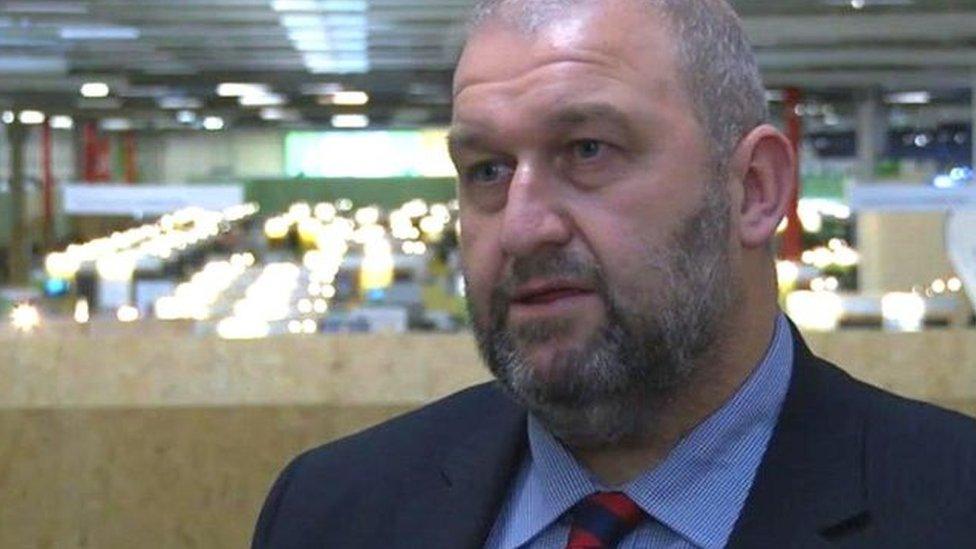Carl Sargeant: Inquest witness 'may have lied' to coroner
- Published
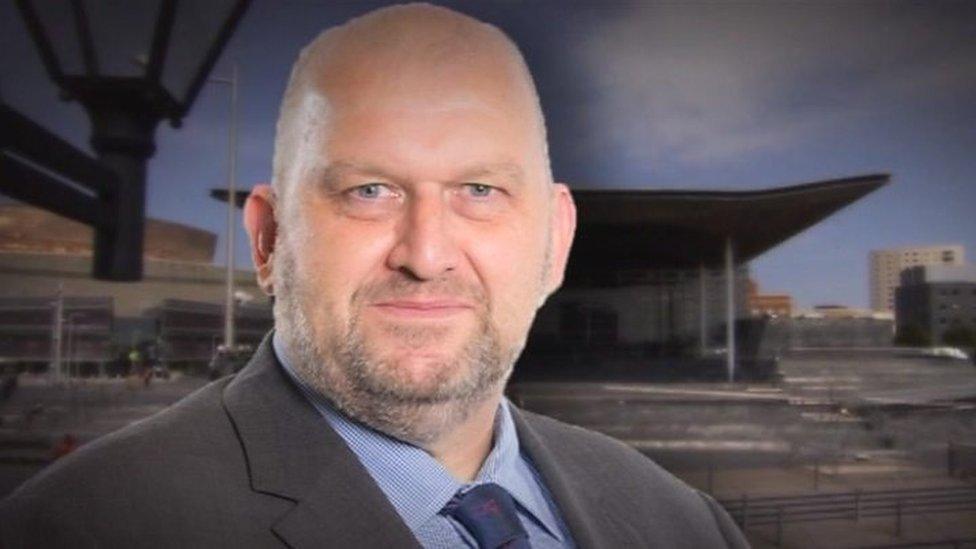
Carl Sargeant was found dead after an investigation was launched into his conduct
A witness in the Carl Sargeant inquest may have lied to the coroner, the hearing has been told.
Mr Sargeant, 49, was found hanged by his wife Bernadette on 7 November at his home in Connah's Quay, Flintshire.
A statement from Flintshire council's deputy leader, Bernie Attridge, said he thought "the sacking killed my friend".
But Cathy McGahey, counsel for Carwyn Jones, said it appeared Mr Attridge had some "knowledge of behaviour that would have made Mr Sargeant anxious".
Mr Sargeant was found dead four days after he was sacked as communities minister by the first minister.
The Labour AM had been accused of behaving inappropriately towards women, which he denied, and the inquest was told "tangible" complaints were made weeks before he died.
He left a letter apologising to his family and telling them: "I have failed you."
Coroner John Gittins agreed to hear applications on the potential submission of new evidence which has come to light from witnesses including Flintshire council leader Aaron Shotton.
Ms McGahey said: "Mr Shotton has come forward with a witness statement that contradicts some of Mr Attridge's evidence.
"There is what appears to be a text message from Mr Attridge to Mr Shotton on November 1 2017... and it appears to refer to Mr Sargeant.
"Mr Attridge bets he is shitting bricks... He refers to MPs in Westminster being exposed and it won't be long before AMs are... on the hit list."
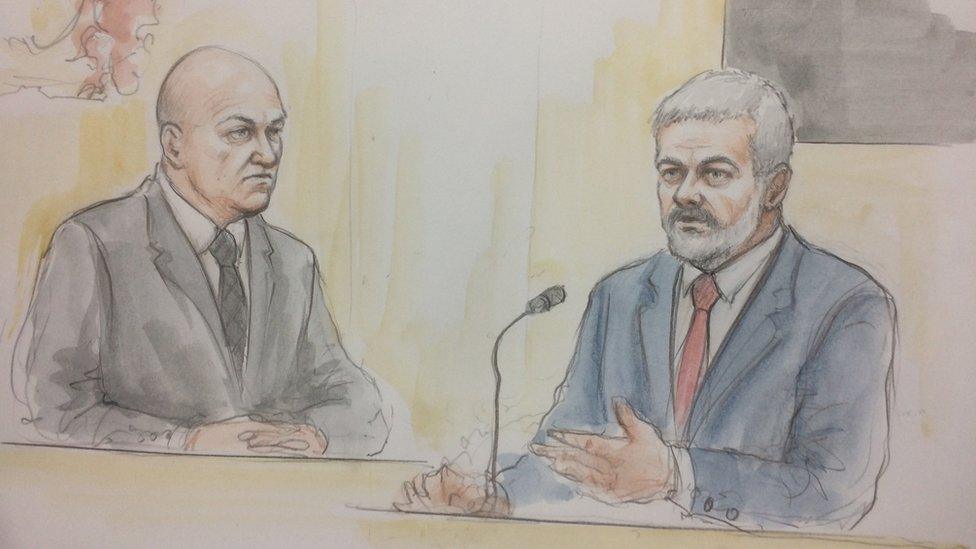
First Minister Carwyn Jones gave evidence to the inquest on Wednesday
Ms McGahey said Mr Attridge went on to say, on 5 November, that rumours about Mr Sargeant were circulating in the Labour Club and he wanted to discourage people in the Labour group from saying anything in support of him.
He then implied, she said, Mr Sargeant had done something "that could lead to imprisonment".
"Mr Attridge and Mr Attridge alone will know exactly what he meant by those," she told the coroner, before adding: "It does appear on the face of it that Mr Attridge has not told you the truth.
"Signing the statement of truth when you know something you are saying is not true, is a contempt of court."
Mr Gittins heard applications from counsel relating to the submission of this new evidence, but he declined, saying he already had enough to do his job.
Earlier, the inquest heard the first minister warned Mr Sargeant to "be careful" over conduct and drinking after an anonymous letter said he was "not fit to be around women".
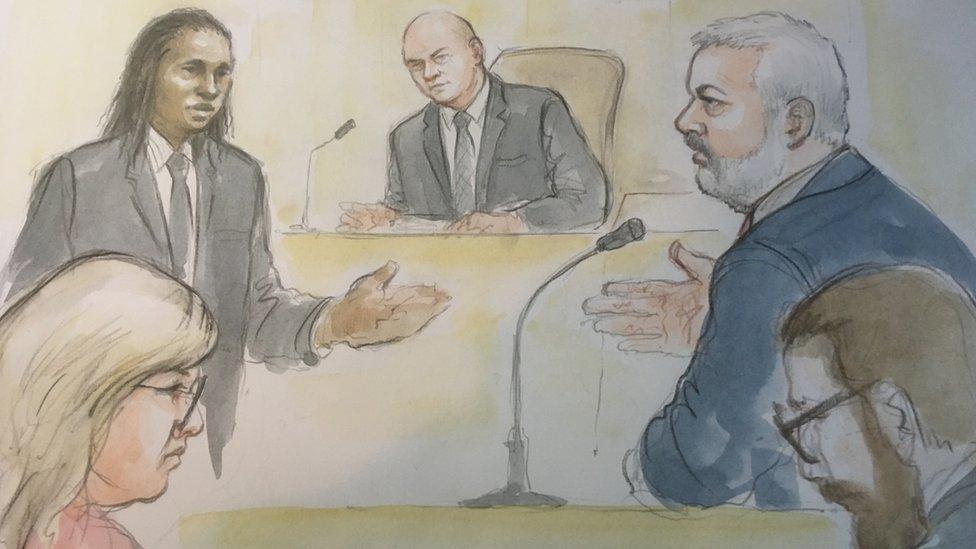
Leslie Thomas QC questioned Carwyn Jones on how Carl Sargeant's sacking was handled
Speaking at the inquest in Ruthin, Denbighshire, on Wednesday, Mr Jones said he had received an anonymous letter in 2014 from someone in Mr Sargeant's Alyn and Deeside constituency.
"I remember the words 'he's not fit to be around women', but the letter was anonymous. I showed it to Carl," he told the hearing.
Mr Jones said he told Mr Sargeant in 2014: "You need to know... be careful, there's obviously someone who's watching you.
"Be careful how you conduct yourself and how much you drink."
He said Mr Sargeant "wasn't an alcoholic", but the company he kept was "quite a hard-drinking bunch".
He told Mr Gittins the pair had known each other since 2001 and had "never had a cross word".
Mr Jones did not know Mr Sargeant suffered from depression or had taken anti-depressants, the inquest heard.
Tweet after dismissal
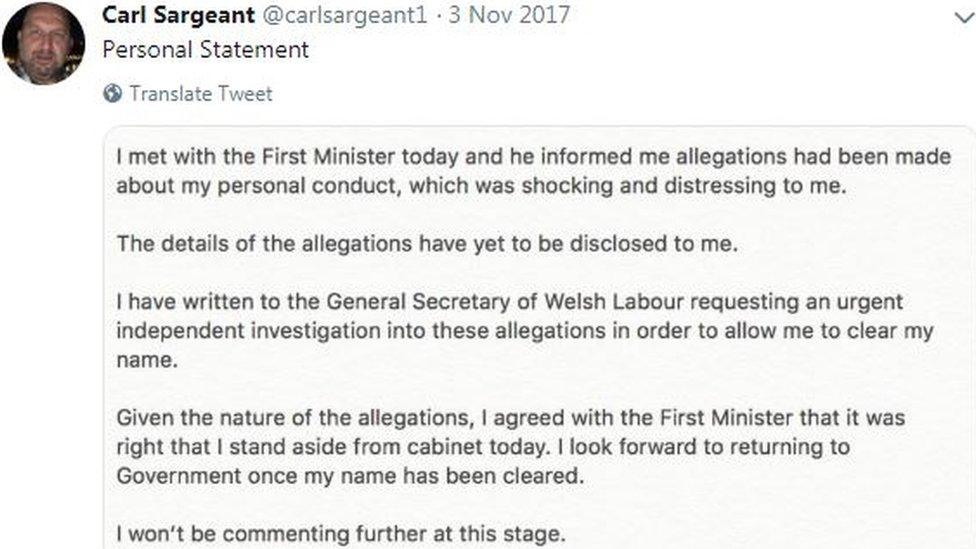
Carl Sargeant tweeted a statement after being sacked by the Welsh Government four days before he died.
Asked when he first became aware of rumours about Mr Sargeant's conduct, he said: "Rumours are plentiful in politics. Evidence is rare."
He did not know what the rumours were, but became aware of them on 18 October 2017, the day he held a meeting with senior advisors to discuss the cabinet reshuffle.
One of two complainants who had made allegations about Mr Sargeant put it in writing to the Labour party in October, dating from an event in summer 2017.
Pushed by the coroner why he had not spoken to Mr Sargeant, he said: "Had I given him more details in terms of the allegations... he'd have known straight away, I suspect, who those people were and that was a risk I couldn't take."
He said "the fact we had names" meant there was "an obligation to look further".
Mr Sargeant tweeted a statement on the afternoon he was sacked - highlighting that it related to personal conduct - and Mr Jones said there was "no need to volunteer the information".
Mr Gittins responded: "So that's what happens in politics? We keep secrets because it suits everybody to do so?"
"It's not secrets. It's a gentler way of doing it," said Mr Jones.
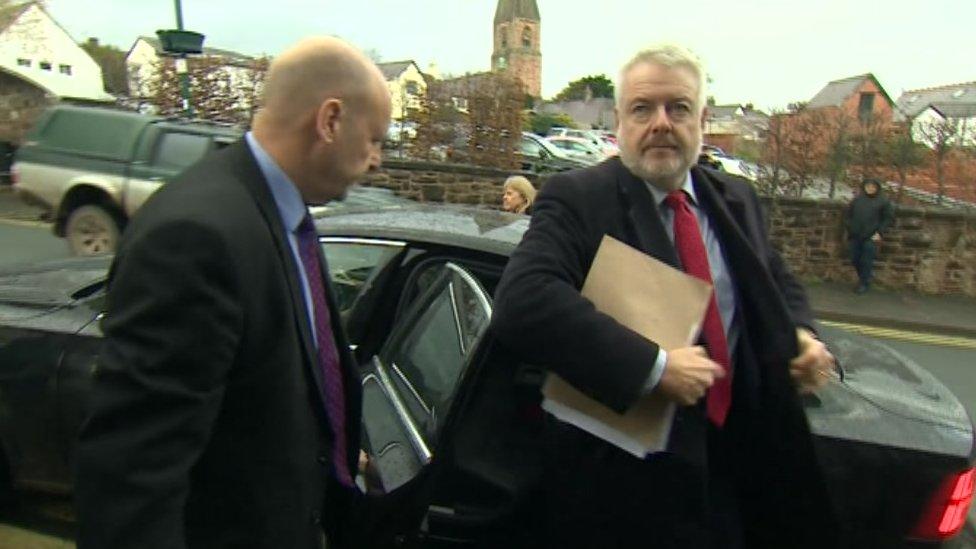
Carwyn Jones is stepping down as first minister in December
Ahead of the meeting between the pair, Mr Jones said he had "a feeling of dread going in that morning... I had lost sleep over it," but said it "had to be done".
Mr Sargeant's response was "curious", and he said he "did not recognise" the allegations.
"In politics, that's not a denial," Mr Jones said.
He was "a little panicked but not distraught," but Mr Jones said there was "no reason to doubt that he understood the implications".
He advised him to speak to his trade union for advice and "keep your head down".
But following Mr Sargeant's tweet, he said the Welsh Government had to "firefight".
"The press would speculate. Twitter is corrosive," he added.
"Because of that tweet there was a media frenzy that made all manner of allegations about Carl that weren't true."
The inquest heard audio of Mr Jones speaking on a BBC Wales news broadcast on 6 November, the day before Mr Sargeant died.
In it, Mr Jones used the words "incidents". The coroner asked him if he saw the difference between that and the word "allegations".
"It's quite clear from that news report that the news report is about allegations," he replied.
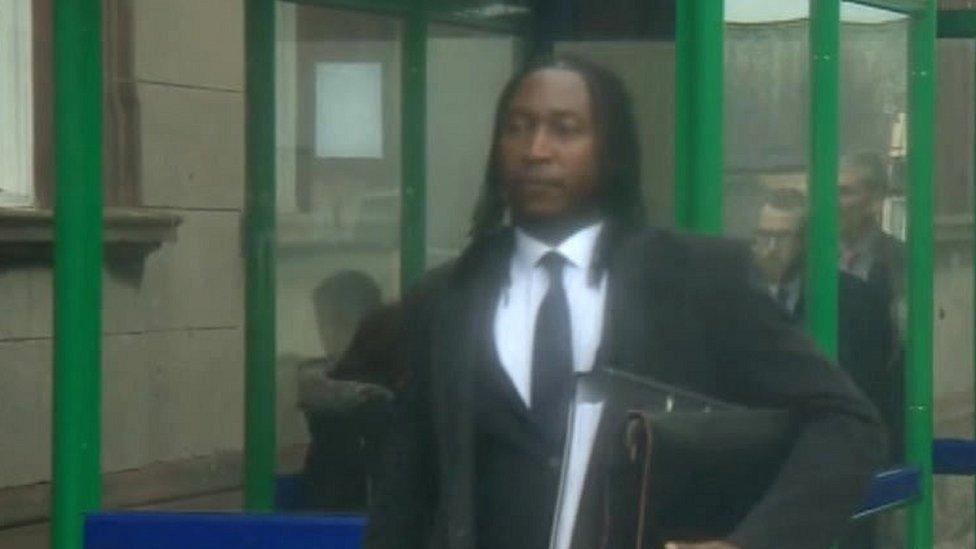
Leslie Thomas QC is representing the Sargeant family
Mr Jones had said the reshuffle happened on a Friday as Mr Sargeant had been away and if it was held mid-week he would not have had the support of his family on hand.
Leslie Thomas QC, representing the Sargeant family, asked why it was necessary to draw Mr Sargeant's attention to the anonymous letter sent in 2014.
Mr Jones felt it was right to let him know, as the letter had also been sent to Mrs Sargeant.
He had not spoken to Mr Sargeant about a complaint from 2016 because "the complainant didn't want me to".
The inquest heard Ann Jones AM acted in a liaison role between the Labour group and Mr Sargeant, and secondly in a pastoral role.
Mr Jones said this happened on the afternoon following Mr Sargeant's dismissal and Ms Jones "wanted to make sure that Carl was okay from a personal level as well".
Mr Jones planned to hold a reshuffle in November 2017 because he was in talks with an AM who had left his party, as well as wanting to offer new opportunities to others.
'Complete discretion'
During the course of the discussions, he received the written complaints about Mr Sargeant.
Prior to that, Mr Jones characterised rumours about Mr Sargeant as "tittle-tattle", according to evidence from one of his special advisors.
Mr Jones said the written allegations, which came just days before the reshuffle on 3 November, "could not be ignored as part of the reshuffle process".
Mr Sargeant, who was being considered for the role of leader of the house, was sacked that day.
Mr Jones confirmed it was "wholly" his responsibility who was appointed or moved and he had "complete discretion" over the cabinet.
Earlier, Mr Jones' senior special advisor Matthew Greenough was recalled to the inquest to clarify some of the evidence he gave on Tuesday, around the timings of allegations made against Mr Sargeant.
The "tangible" complaints referred to alleged incidents in summer 2017, made by women known in court as Miss A and Miss B.
These were reported via the Labour Party to Mr Jones in October 2017. One of two women involved later made a written statement.
'Rumours' about Mr Sargeant
There had previously been two separate allegations in 2016, although one was in the form of an anonymous letter.
Mr Greenough agreed one allegation by a woman known as Miss C could have been made in 2015, but he did not know about it until 2016.
He told the court he was present in the room when the reshuffle where Mr Sargeant lost his job took place and no information regarding any of the women was discussed in his presence.
He told Mr Thomas he did not believe Mr Jones could have had a conversation with anyone without him knowing.
Special advisor Jane Runeckles confirmed there were "rumours" about Mr Sargeant, but he was still in consideration for leader of the house at a meeting on 18 October 2017.
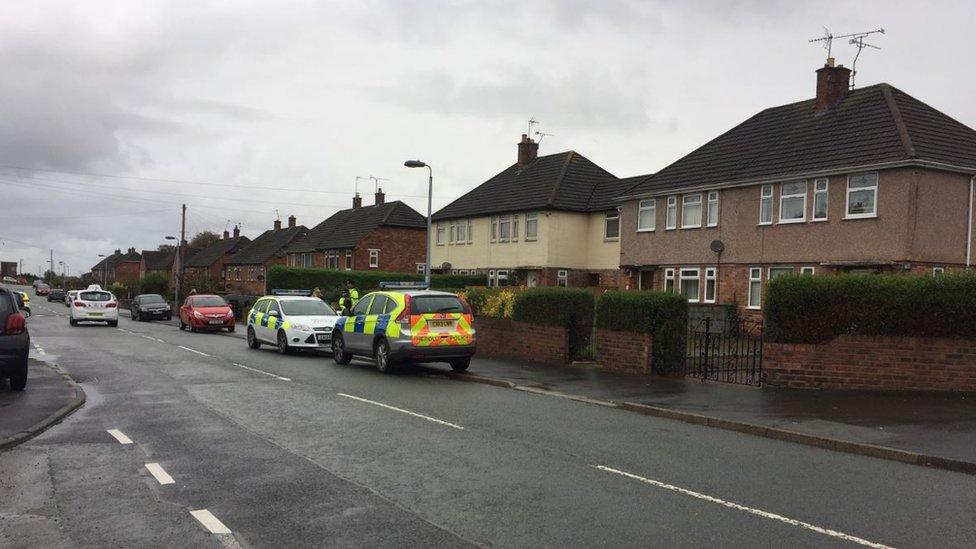
Mr Sargeant's body was found in the utility room of his house in Connah's Quay
The coroner said he struggled to understand how that might still be the case.
"The first minister was absolutely clear at that point that it was tittle-tattle. He had nothing to suggest otherwise," she replied.
Mr Sargeant's sacking was precipitated by Mr Greenough receiving the written statement from one complainant on 1 November.
Mr Gittins asked if that was "the deciding factor in terms of his removal from office", to which Ms Runeckles replied "yes", adding it would have been difficult to postpone a reshuffle.
Mr Sargeant's brother Andy asked whether Ms Runeckles did anything to support him, and she said "no", explaining: "The whim of the electorate is something [politicians] subject themselves to... you go into it knowing that this kind of thing can happen to you."
'Setting the scene'
Mr Thomas repeatedly questioned Ms Runeckles over the 18 October meeting and any discussion of the rumours around Mr Sargeant, particularly in light of the #MeToo movement and "political fallout" in Westminster.
She told the court she did not enquire where the rumours had come from and said they were "not relevant", which Mr Thomas challenged. She agreed she could have spoken to Mr Sargeant about the matter, but did not.
Mr Thomas asked if the reshuffle was "just a convenient way of trying to mask" the situation surrounding Mr Sargeant. "Absolutely not," she replied.
The first minister was asked why, after allegations from Miss A and Miss B in 2017, Miss C - who made her original allegation in 2016 - was contacted to see if she wished to complain.
He accused Mr Jones of "setting the scene" to "get rid" of Mr Sargeant.
"I could've removed Carl from the cabinet for no reason at all," Mr Jones responded.
He said he felt it was right someone who had come forward in 2016 should now be asked if they wanted to make a complaint.
If you or someone you know is struggling with issues raised by this story, find support through BBC Action Line.
- Published27 November 2018
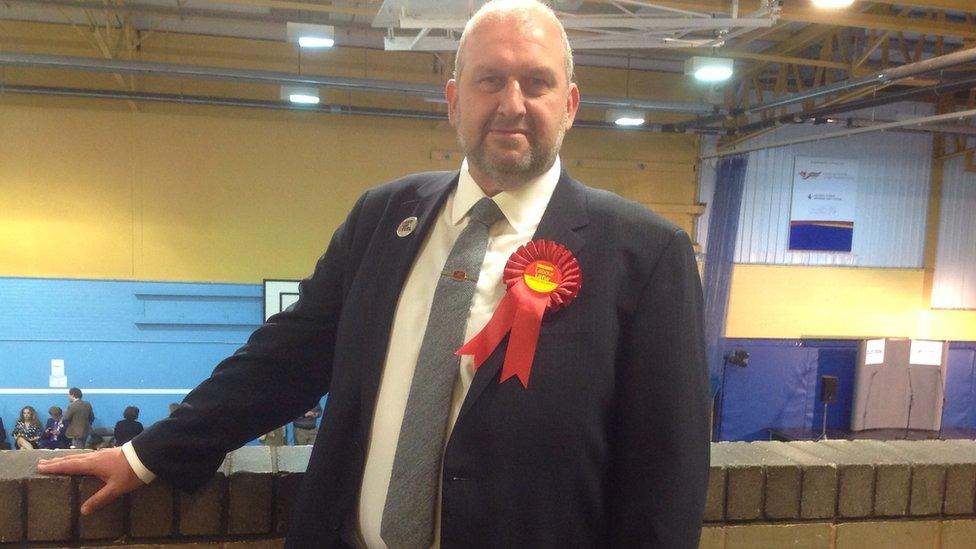
- Published26 November 2018

- Published7 November 2017
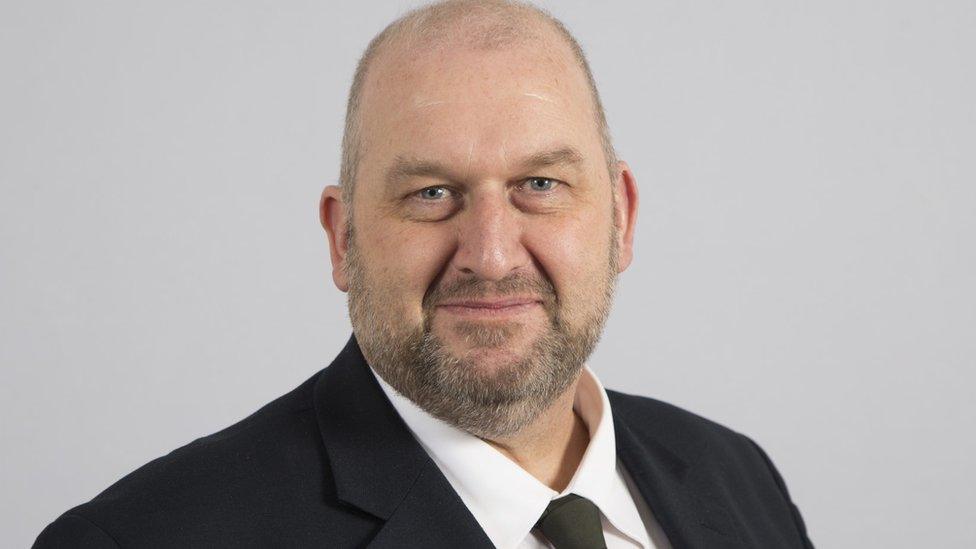
- Published23 November 2018
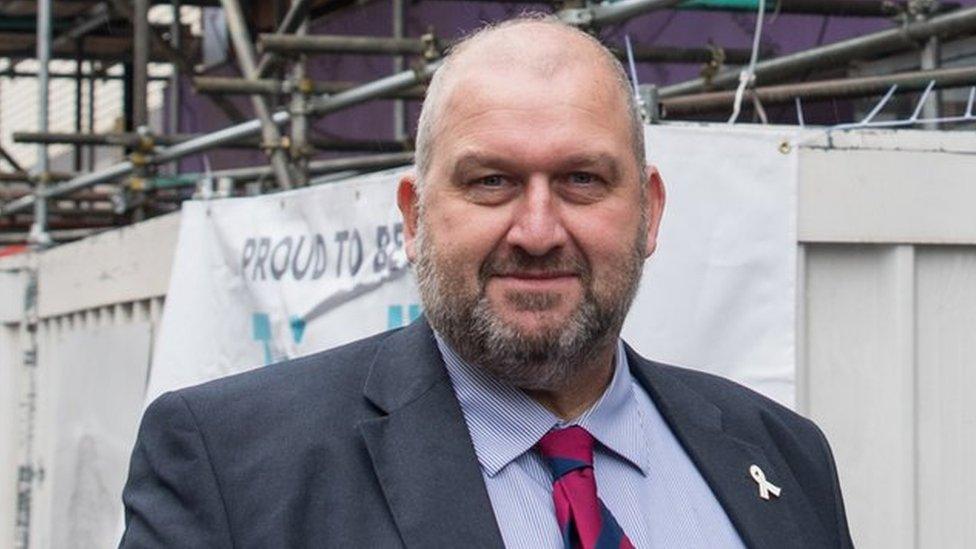
- Published7 November 2017

- Published13 November 2018

- Published13 November 2017

- Published8 November 2017
